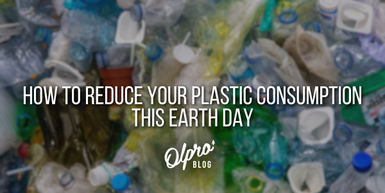Posted by Tori Wilkes on 22nd Apr 2024
How to reduce your plastic consumption this Earth Day
How to reduce your plastic consumption this Earth Day
With the busyness of our daily lives, it's easy to overlook the profound impact that our actions have on the planet. Yet, every choice we make has some form of impact on the beautiful planet that we call home. As we stand on the threshold of Earth Day 2024, it's time to reflect on how we can each play a part in fostering a healthier planet.
Make own lunches and use reusable Tupperware:
With ‘Lunch on the go’ generating 10.7 billion items of packaging waste a year, opting to make our own lunches and store them in reusable packaging is one of the simplest ways that we can reduce our plastic waste. Opting to pre-make on-the-go lunches can not only reduce plastic waste but also have a profound impact on your weekly outgoings. Research suggests that people who buy their lunches are spending an average of £1,840 a year, whilst those who take food from home spend £552, saving a massive £1288 a year! We’d also recommend glass Tupperware to further reduce plastic production and save money due to the almost infinite lifecycle of glass.
Buy shampoo bars rather than bottles:
Switching your normal bottled shampoo for a bar is a great way to reduce your plastic use. Shampoo bars can be bought from most high street retailers with brands such as Garnier, lush and Herbal Essences now selling them at affordable prices, with claims that one bar is equivalent to 2 shampoo bottles.
Stop buying single-use plastic bottles:
Using a reusable bottle is a simple yet impactful step towards reducing plastic waste and enhancing your health. By opting for a reusable bottle over single-use plastic ones, individuals contribute to the reduction of plastic pollution in oceans and landfills. Additionally, having a reusable bottle encourages individuals to drink more water throughout the day, promoting better hydration and overall well-being. It's a win-win solution, benefiting both the planet and personal health.
Switch to loose-leaf tea:
Switching to loose-leaf tea is a fantastic way to reduce plastic waste and embrace a more sustainable lifestyle. Unlike tea bags, which often contain plastic fibre, loose-leaf tea eliminates unnecessary plastic usage. By opting for loose leaves, individuals can enjoy their favourite brew without contributing to plastic waste in landfills and oceans. Even better, loose-leaf tea typically comes in biodegradable or compostable packaging, further minimising environmental impact.
Keep plastic for longer:
Often, completely cutting out plastic use isn’t an option, but making sure to reuse plastic packaging offers a practical and eco-conscious alternative. Items like ice cream and butter tubs can be repurposed multiple times before recycling or disposal, reducing the need for single-use plastics. By washing and reusing these containers, individuals can extend their lifespan and minimise waste. Whether for storage, organisation, or crafting, repurposing plastic packaging helps divert materials from landfills and reduces environmental impact.
Choose sustainability-conscious brands:
Embarking on a journey to go plastic-free entails making conscious choices that align with sustainability goals. Opting for brands like OLPRO, known for our commitment to eco-friendly practices, is a great step in reducing environmental impact. By choosing products from such brands, individuals support ethical manufacturing processes, minimal plastic packaging, and sustainable materials. OLPRO's range of camping essentials, from tents, to campervan awnings, to accessories, reflects a dedication to reducing plastic waste and promoting outdoor enjoyment in harmony with nature. Aligning with sustainability-conscious brands like OLPRO empowers consumers to make a positive impact on the environment while enjoying high-quality, durable products for their outdoor adventures. And even better, if you’re on a journey to reduce single-use plastic consumption, as of 2024 all-new OLPRO canvas products will be made using recycled fabrics.


